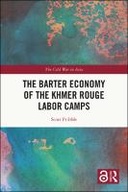Explore

The Barter Economy of the Khmer Rouge Labor Camps
Scott Pribble
2024
0 Ungluers have
Faved this Work
Login to Fave
Pribble investigates the barter economies that developed in many of the labor camps established under the Khmer Rouge in Cambodia.
When the Khmer Rouge abolished currency and markets in 1975, starving Cambodians created underground exchanges in labor camps throughout the country, bartering luxury items for food and other necessities, while simultaneously undermining the regime’s ideological goals of eliminating any traces of capitalism in Democratic Kampuchea. Pribble asserts three key points about the barter economy in the Khmer Rouge labor camps. First, the underground exchanges in Democratic Kampuchea provided food and medicine for desperate people subsisting under a totalitarian regime, saving the lives of countless Cambodians. Second, bartering was the riskiest way to obtain food because it was dependent upon the discretion of two or more individuals from different social classes under the threat of violent punishment, thereby altering the social dynamics of the camps. Finally, despite the regime’s extreme efforts to eliminate foreign influence from the country and impose communist ideology on millions of citizens, basic forms of market capitalism and a demand for superfluous luxury goods persisted in labor camps throughout the country.
A fascinating study of the human consequences of imposing rigid ideology, that will be of particular interest to scholars and students of political history and Southeast Asian history.
This book is included in DOAB.
Why read this book? Have your say.
You must be logged in to comment.
Rights Information
Are you the author or publisher of this work? If so, you can claim it as yours by registering as an Unglue.it rights holder.Downloads
This work has been downloaded 66 times via unglue.it ebook links.
- 66 - pdf (CC BY-NC-ND) at Unglue.it.
Keywords
- Asian history
- Cambodia
- Communism
- General & world history
- History
- Humanities
- kampuchea
- Labor camps
- Market Capitalism
- Pol Pot
- Rationing
- Regional & national history
- thema EDItEUR::N History and Archaeology::NH History::NHB General and world history
- thema EDItEUR::N History and Archaeology::NH History::NHF Asian history
Links
DOI: 10.4324/9781003346371Editions

